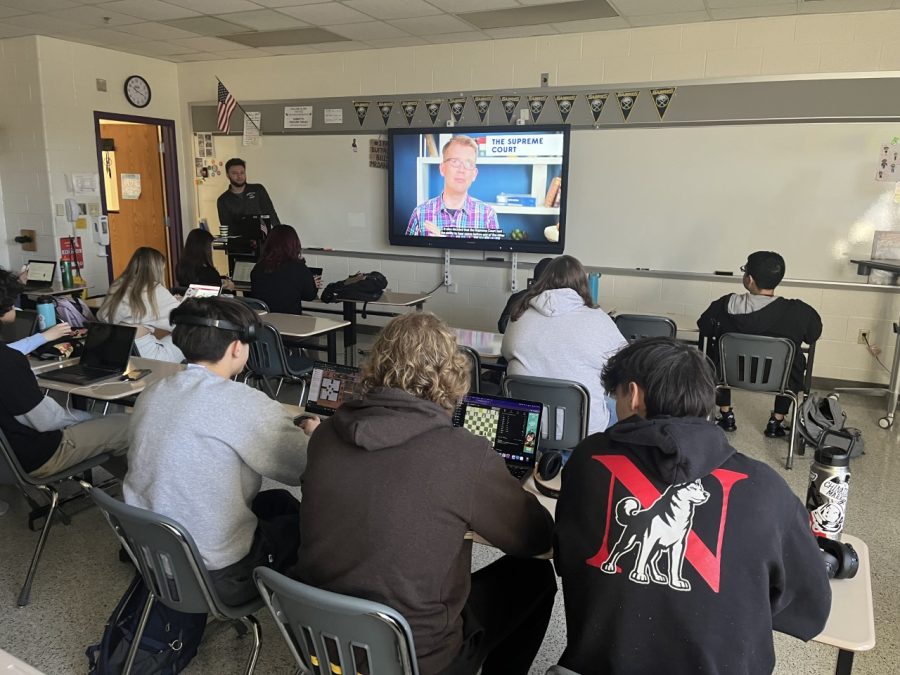Four Day vs Five Day school week: What do Students Prefer?
As conversations about possible changes to the structure of the school week arise, students and staff members at LCPS chime in about how they feel.
Recent surveys conducted among LCPS employees discussing possible changes to the structure of upcoming school years have recently arisen. As neighboring counties considered making adjustments to the way the school year is structured, LCPS has begun to follow suit as they conducted a poll amongst teachers. This poll required teachers to vote on their preferences regarding the potential of shorter summers, four day school weeks, and more frequent breaks on the elementary, middle, and high school levels.
Although there is no plan in place to implement these changes in the near future, it could lead to something LCPS would consider incorporating in subsequent years. The most likely possibility would be the transition to a four day school week, where Monday serves as an asynchronous day for students and teachers and administrators would come into the building. The incorporation of this change would most likely result in the reduction of summer break by a couple weeks, but would provide students more time to complete school assignments during the week. With all the pros and cons of this possibility, we are faced with the question: What are the opinions of Potomac Falls High School students and staff regarding these circulating changes?
Certain students think switching to a four day work week would be beneficial to students, especially for high schoolers. “I’d prefer a four day work week, because it would give me more time to do my homework and reduce my overall stress throughout the school week,” said sophomore Grace Chandler.
Other students support the possibility because they remember the benefits from when LCPS followed a four day school work schedule in the 20-21 school year. “When we had asynchronous Mondays online, I had time to get my work done,” said sophomore Abby Marquez. “It was nice to have an extra day to complete assignments, it would definitely be worth it even if it meant summer was a few weeks shorter.”
The majority of students at PFHS polled were enthusiastic towards the idea of a shorter school week, some others are opposed to the idea.
“If summers weren’t affected, I’d consider the possibility of a four day school week, but I’m not willing to have a shorter summer break, since it’s my main time to chill and relax,” said junior Anna-Claire Campbell. The implementation of a four day school week would most likely indicate a shorter summer break, but it’s difficult to know exactly what that would look like if LCPS made an official decision. Other students are apprehensive about the idea because they believe the switch would be unnecessarily confusing for students.
“I’d prefer having a five day week and keeping our regular summer, since the transition to a four day school week would be a lot to transition to,” said junior Brooke Simpson. “Additionally, summer is everyone’s time to relax, and I wouldn’t want to shorten the summer, even if it meant the school weeks were also shorter.
With students so evenly divided between two potential options, it’s important for administrators to consider the changes before completely shifting the school schedule. According to acting superintendent Dr. Daniel Smith, unless the results of the survey earlier mentioned are overwhelming, the chances of implementing this shift are still slim. “We put a lot of options out there, I know the four day week provides a lot of challenges, especially considering families that work a five day week with younger kids around the elementary age,” said Smith. “It’s a pretty big shift; it’ll probably take a lot of our industries and businesses in the area to transition in order to make it easier for us to do that as well.”
Before even considering a switch, LCPS officials would have to factor in the pros and cons of either option. According to a study done by the Robert Wood Johnson Foundation, the four day school weeks increased productivity for students and provided them more time to spend on sports and chores. However, a four day model presents some drawbacks, including lack of childcare options for families with younger children and fewer meals for low income families. In conclusion, while a four day school week model might be popular among many students and staff, the amount of changes it would bring to the overall school structure indicates it’s not a change that’ll be implemented in immediate school years.


